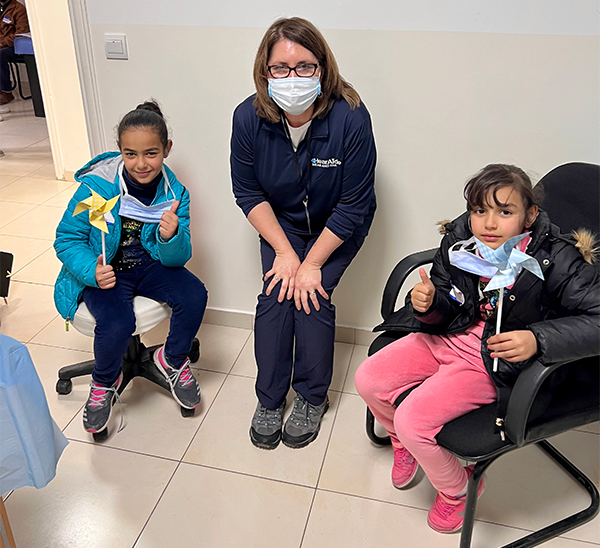An unexpected opportunity to travel to Jordan on a medical mission trip earlier this year left Dr. Lori Pakulski feeling inspired and with a new sense of dedication to ensuring everyone has access to effective hearing care.
Pakulski, an audiologist and professor in The University of Toledo Speech-Language Pathology Program, had planned to spend her sabbatical on new research examining how unidentified hearing loss may affect healthcare communication and possibly negatively impact medical diagnosis or treatment.

Dr. Lori Pakulski, an audiologist and professor in UToledo’s Speech-Language Pathology Program, was part of an international team evaluating individuals for hearing problems in a pair of refugee camps inside Jordan.
Logistical challenges related to the pandemic, however, forced a pause on that project and she found herself searching for another meaningful way to spend her time.
A last-minute invite from Dr. Randa Mansour-Shousher, a University of Toledo alumna and retired audiologist, to join a trip to Jordan aimed at addressing the hearing health needs of people living in Palestinian refugee camps gave Pakulski that chance.
“I went on the trip without really knowing much about what I had signed up for. The Middle East was not a place I’d ever considered visiting, but I wanted to support Randa and her mission,” she said. “What I learned and what I experienced will change my career and my own personal way that I operate.”
For nearly a week in March, Pakulski was part of an international team evaluating individuals for hearing problems in a pair of refugee camps inside Jordan. Many of those they saw have been suffering from gradual hearing loss for years but had never received a hearing test or had access to services.
“These people have been displaced from their home and are in an endless cycle of poverty without much access to healthcare services,” Pakulski said. “There’s a high percentage of hearing loss, which can lead to children not learning language, men forced out of the workforce and elderly individuals pushed aside. It is a significant problem among this population.”
The team removed earwax, provided hearing evaluations, and worked to fit individuals with donated hearing aids — a process that would normally take multiple clinic visits over a month. In the camps, the exercise was condensed into a few hours, allowing people to go home with hearing aids that same day.
One of the things that stuck with Pakulski most was how eager individuals were to accept the hearing services being offered.
In the U.S., roughly 80% of those with hearing loss don’t take any steps to address it, she said. However, in Jordan, the team was discouraged from posting anything on social media until after the clinic was completed because people would walk for hours for a chance to be seen.
“They were so joyful to get these instruments that we can’t pry onto family members, let alone patients,” she said. “In the U.S. hearing loss is often overlooked and seen as a natural part of aging. It’s a stigma we really need to overcome.”
In total, they saw about 100 people, ranging from young children to elderly adults.
The clinic was funded by HearAide, a Toledo-based nonprofit organization founded by Mansour-Shousher to provide hearing services to those otherwise unable to afford them both in northwest Ohio and abroad through mission trips.
“We saw people literally dancing after they received their hearing aids,” Pakulski said. “If someone’s not able to hear, you don’t have that human connection that we strive for. Moving forward, I hope to be able to educate people in our profession and related professions about the importance of this kind of work.”
Pakulski also is investigating the potential of establishing an online therapy program to assist refugees in Jordan and provide ongoing support to the hearing clinics provided by HearAide.
Another trip is being planned for the fall.